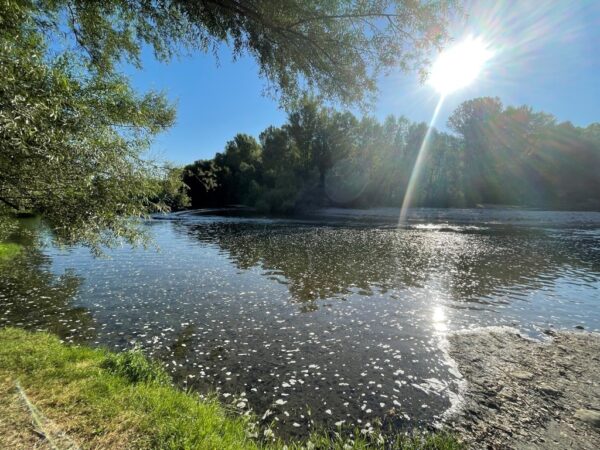Tens of thousands of new homes face being delayed or scrapped because of river pollution that could cost the economy £16bn, a BBC investigation has found. Tougher rules on phosphate river pollution targets have been brought in – but that could affect 100,000 new-build homes in England and Wales.
Experts say more phosphate, found in animal and human waste, is getting into rivers and affecting water quality. The pollution is a problem partly caused by us and our demand for cheap food. That demand has driven an industry that’s threatening to overwhelm our environment, says the BBC.
The building of more than 5,000 new homes are affected in Wales because of tighter phosphate pollution targets on rivers which were adopted in 2020. That could cost more than £700m to the economy. Developers want governments to take urgent action to find a solution.
‘Delays could cost £16bn’
The Home Builders’ Federation (HBF) contacted planning authorities and developers and calculated 100,000 homes in 74 areas in England are also affected by phosphate restrictions on housebuilding.
The HBF estimate the impact could be a £16bn loss in economic activity in England and Wales. That figure is calculated from an industry standard model, factchecked by the BBC, that projects the financial footprint of new homebuyers, including spend in the local economy and taxes.
‘Serious damage’
Natural England, said phosphate pollution is causing “serious damage” to rivers and wetlands – and the species that live in them – and made £100,000 available for each affected river catchment.
“These are also the same habitats that we need to protect us from the impacts of the climate crisis such as drought,” said Melanie Hughes of Natural England.
“Nutrient Neutrality is a way of making sure that new housing does not add to the problem by ensuring developers can take action to reduce pollution, such as by making new wetlands.
Warning ecosystem will ‘collapse’
The River Wye catchment is failing Joint Nature Conservation Committee targets and Natural Resources Wales (NRW) estimates almost three-quarters of phosphates entering the river are from rural land use, like farming.
Is pollution because of intensive farming?
Campaigners believe intensive poultry farming is responsible. Data gathered by the Campaign for the Protection of Rural Wales has found that, since 2008, more than 300 intensive poultry farms and farm extensions have been given planning permission in Powys, which covers a large area of the Wye.
But water quality monitoring has not been able to prove a direct link between phosphates in the river and chicken farms. “Agriculture is part of the problem,” National Farming Union Cymru President Aled Jones told the BBC. “It’s a very complex issue. There are so many other contributors to the water failing in these rivers.
Can a manmade wetlands stop river pollution?
Near the Wye in Herefordshire, building has started on the first wetlands in the UK to be funded by developers buying what is being described as “phosphate credits”.
Such measures aim to stop putting more nutrients, like phosphate, into rivers – similar to carbon offsetting. The wetlands in the village of Luston, near Leominster, should prevent 200kg of phosphate going into the river every year.
‘Developers don’t mind doing more for biodiversity’
Developer Merry Albright has 52 house builds on hold due to the phosphate restrictions but is benefitting from the wetlands scheme.
She said: “New housing didn’t cause this problem and yet we are being blamed and also
being asked to pay for a solution which won’t really fix the bigger problem. “I’m happy to do the best for the environment so I’m not seeking someone to eradicate the red tape but I would like people to focus on what caused this and what is needed to be done to fix it.”

No Comment